Norway's Havyard to Develop New Category of Hydrogen Cargo Ship

Norway’s Havyard reports that an unidentified European company has commissioned the group to develop the designs for a new emission free vessel that will use hydrogen for its fuel while transporting cargo between European ports. According to the company, the vessel which will represent a new concept in moving cargo will be part of the drive to develop green solutions to achieving Europe’s climate goals.
“The framework for this contract is to develop a ship that uses hydrogen-based fuel as its primary energy source while at the same time giving the client an effective and safe ship,” says Lars Conradi Andersen, Vice President Sales. “The goal is to design a large ship that can sail longer distances with zero emissions.”
According to Havyard, the pilot project seeks to will combine the company’s expertise in hydrogen energy systems and ship design to develop this new category of ship. Havyard recently established a new company, Havyard Hydrogen AS, as a spin-off of the company’s R&D work in the area of hydrogen propulsion. Havyard has previously been working on hydrogen projects for large vessels.
Executive Vice President of Havyard Hydrogen Kristian Osnes says that they are noticing a trend where the market demands specific zero-emission solutions. He is looking forward to working on the challenges of combining the right technology with the right ship design for this client. “This is precisely the type of project that we need to expand the portfolio of zero emission solutions into new ship segments,” says Osnes.
Havyard noted that it was introduced to this client by Invest in Norway, the official investment promotion agency of Norway. They have been working together for the past two years in supporting their entry into the Norwegian maritime industry.
The design and development of ships operating on hydrogen, Havyard notes, presents a unique set of challenges. For example, Hydrogen-based fuels must be stored differently than traditional fuels, since they require more space and different security systems.
The new partner has taken note of Havyard’s hydrogen expertise and work on zero-emission vessels, in addition to Havyard Design’s advanced simulation tool for developing energy-efficient solutions. Using Havyard Ocean LAB tools it will be possible to create a digital twin of the ship and put it “in operation” on a virtual ocean. This will allow experimenting with hundreds of alternatives to clarify the basic size and framework conditions for the ship. They can also explore the ship and the planned route including all information about weather and wind, current and wave data making adjustments to ensure maximal efficiency in terms of both the environment and budget. Then they can select the best alternatives and proceed to the development of the final documentation.
“Havyard is the ideal partner in this regard since our research and development work in the area of both hydrogen and simulation-driven ship design has given us unique cross-cutting expertise in how to design ships with low environmental impact,” says Andersen.
Havyard did not announce a timeframe for the project or when the vessel might be ready to enter service.
Last fall, Havyard announced that it would restructure its shipyard operations in Leirvik focusing on repair and service while pursuing new opportunities in technology and with new operations including the company devoted to the development of hydrogen technologies.
